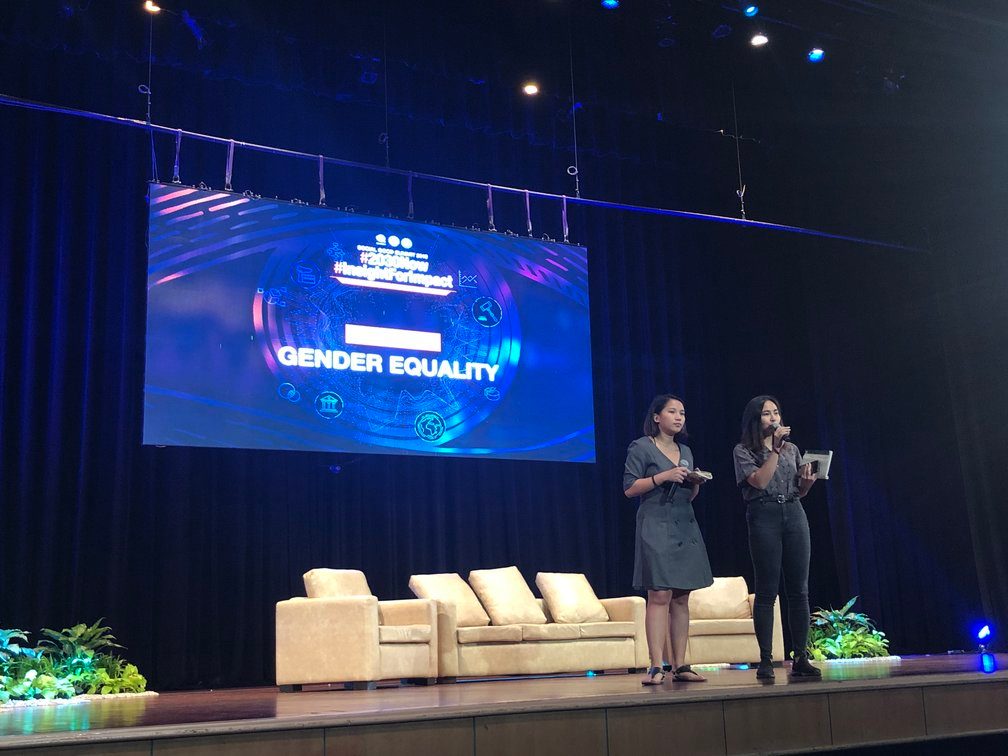SUMMARY
This is AI generated summarization, which may have errors. For context, always refer to the full article.

MANILA, Philippines– What do you know about SOGIE?
While some know that it means sexual orientation and gender identity and expression, others may still not be fully familiar with the term and what it entails, especially as the passage of the SOGIE equality bill is being pushed in Congress.
At the 2019 Social Good Summit huddle on gender equality, advocates discussed the challenges of mainstreaming gender issues and brainstormed solutions that would help forward the cause.
Participants Bianca Lacaba and Aella Potestades represented the winning group at De La Salle University on September 21, and highlighted the need to set up intimate discussions to break down misconceptions about SOGIE and the SOGIE equality bill, which seeks to provide protection for the LGBTQ+ community. (READ: A look at SOGIE anti-discrimination laws around the world)
Potestades pointed out that people need safe spaces offline since discussions on social media may alienate individuals who may be allies if given the chance to be educated on the matter. (WATCH: What you need to know about SOGIE)
“The discussion about gender on social media specifically is very hard for some individuals. Every time someone asks a question or say something different from the majority opinion, they get cancelled by a lot of people,” she said.
“We find that very hard for people who want to join the movement but do not have the pipeline to join it. That’s why we want to create safe spaces offline to allow intimate conversations in coffee shops with people who are interested to know,” Potestades added.
These intimate discussions, which will be held in small cafes, will gather friends and people interested in understanding the cause and unlearning the stereotypes that one may have associated with the LGBTQ+ community.
Potestades noted that understanding SOGIE might be difficult for some because their understanding of gender was limited only to male and female, disregarding the other members of the spectrum who experience different forms of discrimination based on their gender and sexuality.
“We think that the only way we can bridge that gap is if we create more spaces where there is more chance for us to be intimate with each other, where we can have a personal stake in other people’s struggles even if we don’t go through the same struggles,” Lacaba added.
The intimate discussions could be a platform for people to share their personal experiences and the influences that might have affected their perspectives on SOGIE.
Lacaba and Potestades hoped that these intimate discussions will later be replicated in other communities, with the next phase being a training for facilitators of these gatherings for proper moderation. These discussions might even be done with the help of local government units and corporations for a much wider reach.
“They can bring the discussion on unpacking toxic masculinity in their own communities so that we have more people onboard who would be able to understand that the effects of toxic masculinity goes across the board and is not just applicable to a few individuals in our communities,” Lacaba said.
Seven groups presented different ideas to help address gender inequality in the country. The judges were composed of the panelists of the huddle: SPARK!’s Maica Teves, Austrian Embassy’s Zelpha Bombais, Metro Manila Pride’s Nicky Castillo, Bahaghari Conversations’ Vaughn Alviar, and Philippine Business Coalition for Women Empowerment’s Julia Abad. – Rappler.com
Add a comment
How does this make you feel?
There are no comments yet. Add your comment to start the conversation.